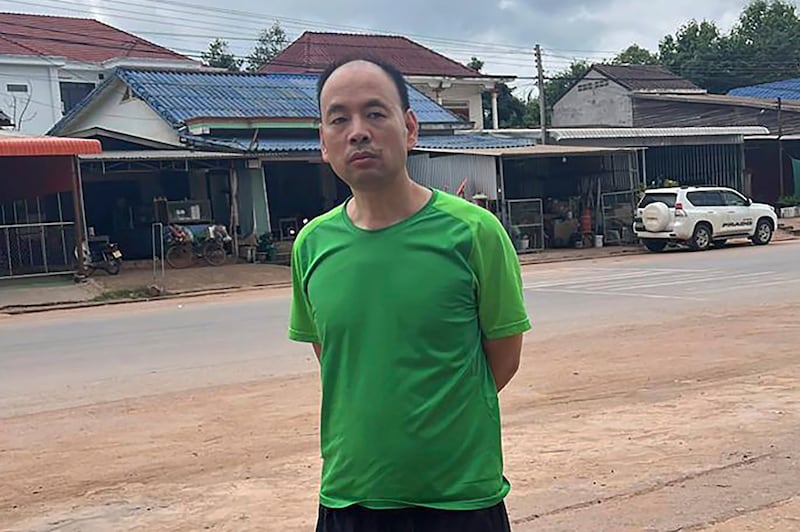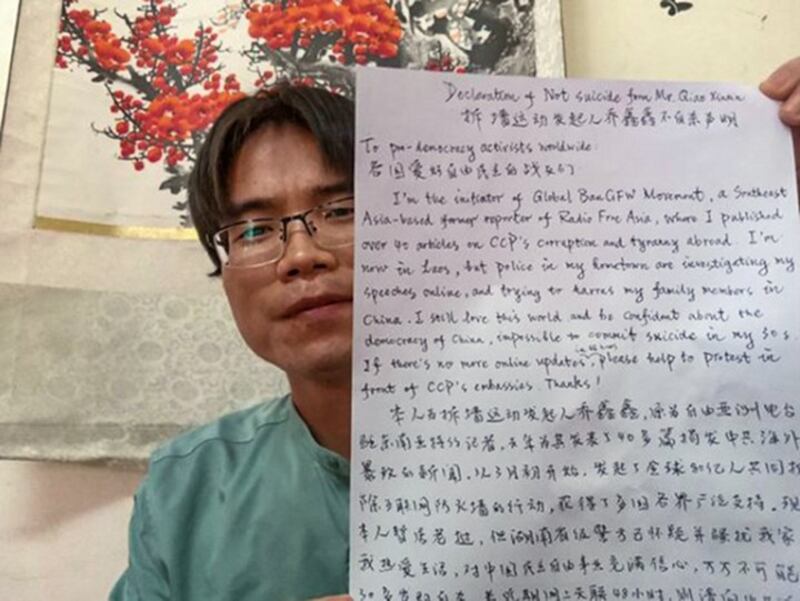A former Chinese judge who tried to visit detained human rights lawyer Lu Siwei at an immigration detention center in Laos has described being grabbed and manhandled by Lao police, who snatched away his cell phone.
Canada-based Li Jianfeng, a former judge in China's legal system, said the scuffles ensued after he tried to visit rights attorney Lu Siwei in an immigration detention center on Aug. 1, following what rights groups said is another example of "long-arm" international law enforcement by Beijing.
Lu, a prominent rights advocate who lost his law license after speaking out about the cases of 12 Hong Kong activists detained by the Chinese coast guard after the 2019 protest movement, was arrested in Vientiane on Friday morning as he boarded a train for Thailand, en route to the United States to join his family.
Li told Radio Free Asia that he was concerned about Lu, who was held by Lao immigration police amid claims of an issue with his passport. But when he arrived at the immigration detention center, he was unable to visit because Tuesday was a public holiday.
But just as he and his friend – a U.S. national – were leaving the facility, they found an office filled with police officers, knocked and entered, he said.
One of the officers in that room was the same policeman who took Lu away.
"The police were very nervous ... and surrounded us as if they were facing an enemy," Li said, adding that he had started filming right from the start.
Li and his friend were taken upstairs to separate interrogation rooms, and Li was interrogated by four police officers, who told him to delete the video from his phone.
At China's behest
Police told Li that Lu wasn't being held at the facility, and threatened him, he said.
"They asked their superiors for instructions, then asked me again to delete the video on my phone, but I refused," Li said. "Then they said ... that if I didn't delete it, they couldn't guarantee my safety if something should happen to me in Laos."
"They tried to snatch my cell phone ... then they called four more policemen, making a total of eight officers," he said. "They pinned my arms behind my back, grabbed my head and my legs, and finally snatched away my phone."

But the officers were unable to get into the phone without the access code, he said.
Li said he believed the Lao police were acting on instructions from China, whose "long-arm" law enforcement has prompted a wave of international criticism in recent months.
He said he had personally witnessed a large number of Chinese police billeted in a hotel in Laos.
"They're in a hotel not far from me," he said. "I can take full responsibility for telling you that there are 200 police officers there, sent by the Chinese Communist Party."
He noted that Beijing wields enormous influence in Southeast Asia, particularly in Laos, Cambodia, Thailand and Vietnam.
Informal rendition worries
Rights groups and Li's U.S.-based wife Zhang Chunxiao are particularly worried that Lu could get sent back to China informally, bypassing formal, criminal extradition processes.
"Lawyer #LuSiwei, detained in Laos, faces imminent return to China," the overseas-based Chinese Human Rights Defenders network said via its X account.
"His wife notes the Convention against Torture states that Laos must not 'return a person to another State where there are substantial grounds for believing that he would be in danger of being subjected to torture'," it commented.
"If my husband is forcibly repatriated to China, he is certain to be tortured or subjected to ill-treatment," Zhang said in a video appeal posted to the group's account. "I call on the government of Laos to ensure that my husband receives the protections he is due according to the United Nations and international law on refugees."
"I call on international governments to help rescue my husband and allow our family to be reunited in the United States," she said.

A consortium of international rights groups including Amnesty International and PEN America said Lu faces a "high likelihood of torture," adding that China frequently puts pressure on Southeast Asia governments to forcibly repatriate its nationals, many of whom have then been subjected to "arbitrary detention, unfair trials, torture, enforced disappearances, and other ill-treatment."
"These individuals are effectively disappeared for extended periods, with family members and colleagues unable to obtain information until months or years after," the groups said in a July 28 statement posted to the website of PEN America.
"By handing Lu Siwei over to the Chinese authorities, the Lao government would be putting Lu Siwei at grave risk of torture and inhuman treatment," it said. "UN rights experts have found that the Chinese government frequently subjects rights defenders and lawyers to torture and inhuman treatment."
It called on the Lao government to halt any repatriation process and release Lu, or at least disclose his whereabouts and allow him to meet with U.S. and other diplomats, as well as a lawyer.
'Dangerous situation' for Lu
Lu's detention comes amid ongoing concerns for safety of Laos-based Chinese free-speech activist Qiao Xinxin, whose associates say he has been incommunicado since early June, amid reports of his arrest by Chinese police in the Laotian capital.
Qiao, whose birth name is Yang Zewei, went missing, believed detainedon or around May 31 in Vientiane, after launching an online campaign to end internet censorship in China, known as the BanGFW Movement, a reference to the Great Firewall, according to fellow activists.
Peter Dahlin, founder of the rights group Safeguard Defenders, said via his account on X -- formerly known as Twitter -- that Chinese influence is very likely a factor behind Lu's detention.
"Hard to believe the Laotian government isn't acting on behalf of the Chinese police," Dahlin posted on July 28. "What happens next will clarify why lawyer #LiSiwei has been detained."
Bob Fu, who heads the U.S.-based Christian rights group ChinaAid, said he had sent an assistant to Laos to try to track Lu down.
"Lu Siwei is in a very dangerous situation right now," he said, calling on the Lao immigration bureau to take "humanitarian considerations" into account.
Lu made international headlines after he was hired by the family of Quinn Moon, one of 12 protesters who were jailed after trying to escape to democratic Taiwan by speedboat following the 2019 Hong Kong protest movement.
He was particularly vocal in the months following their initial detention and repeatedly commented about his unsuccessful attempts to gain access to his client.
After his law license was revoked in 2021, Lu told RFA that he couldn’t have predicted he would end up in this situation.
“Sometimes it is difficult to imagine what your life will bring,” he said. “You can make some plans, but there are still some certain events that will change your life.”
Translated with additional reporting by Luisetta Mudie .
